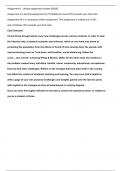Assignment 6 - Unique assignment number 639262
Assignment 6 is the final assignment for PYC4808 and counts 35% towards your final mark.
Assignment 06 is a compulsory written assignment. This assignment is marked out of 100,
and contributes 35% towards your final mark.
Case Scenario
Covid-19 has brought about many new challenges across various contexts. In order to slow
the infection rate, a national lockdown was enforced, which on one hand was aimed at
protecting the population from the effects of Covid-19 and slowing down the spread, with
new terminology such as "lock-down, self-isolation, social distancing, flatten the
curve....new normal" surfacing (Pillay & Barnes, 2020). On the other hand, the solution to
the problem created many individual, familial, social, community, educational, occupational,
financial and other challenges. Reflect on the changes that took place both in the country,
but within the context of academia, teaching and learning. You may even find it helpful to
write a page of your own personal challenges and insights gained over the last two years
with regards to the changes we have all experienced, to varying degrees.
Once you have thoroughly reflected on the above, answer the questions below, in relation to
you as a student at Unisa.
,Question 1
In view of the above excerpt, as a student of Unisa, a Open Distance Learning Education
Institution, provide a first order cybernetic analysis of Unisa as a system. In your answer, describe
the context as a first order cybernetic thinker, and apply at least five (5) first order cybernetic
principles/concepts to your analysis. (25 marks)
Question 2
In view of the above excerpt, as well as your answer for question 1, include yourself in the
observed, and provide a second-order cybernetic analysis of Unisa as a system. In your answer,
describe how a second-order cybernetic thinker would contextualise Unisa, and apply at least five
(5) second order principle/concepts to your analysis (25 marks)
Question 3
Second order cybernetics can be viewed as a meta-perspective. In line with this premise, answer
the questions below:
3.1 According to Becvar and Becvar (2014), systemic thinking is not an either/or approach.
Discuss this statement and justify how FOC and SOC can be integrated in a complementary
manner. (10 marks)
3.2 In all professions there are both explicit and implicit ethical guidelines, which have been
drawn up to ensure efficacy and competency. Discuss the ethical considerations to bear in mind if
you were working from an ecosystemic perspective (include the ethical considerations for both
FOC and SOC). (10 marks)
3.3 In your opinion, how can African ideologies and indigenous knowledge systems be
incorporated into ecosystemic psychology? (10marks)
3.4 Provide a critique of ecosystemic psychology in which you cover both its merits and its
shortcomings. (10 marks)
Question 4:
This is not a question, however, a mark will be awarded for referencing. You need to include both
in-text references and a reference list that follows the American Psychological Association (APA)
7th edition guidelines. (10 marks)
, Reference List
Pillay, A.L., & Barnes, B.R. (2020). Psychology and Covid-19: impacts, themes and way forward.
South African Journal of Psychology, Vol 50(2), 148-153 DOI: 10.1177/0081246320937684
journals.sagepub.com/home/sapPYC4808
Q1 entails:
• FOC analysis of UNISA as a system.
• Context as a FOC thinker.
• FOC principles / concepts.
Q2 entails:
• SOC analysis of UNISA as a system.
• How would SOC thinker contextualise UNISA.
• SOC principles/concepts.
Q3 entails:
• Not an either-or approach.
• Justify how FOC and SOC can be integrated.
• FOC and SOC ethical considerations.
• Incorporating African ideologies and indigenous knowledge systems into systems psychology.
• Merits of shortcomings of ecosystemic psychology.
Let’s start
We are limited to ten (10) typed pages; we can structure the document as follow (example):
➢ Cover page
➢ Plagiarism declaration (either at start or end)
➢ Table of content
➢ Introduction (do not number heading)
➢ Q1 first order cybernetic analysis of Unisa as a system
➢ Q2 second-order cybernetic analysis of Unisa as a system
➢ Q3
➢ 3.1 how FOC and SOC can be integrated in a complementary manner




